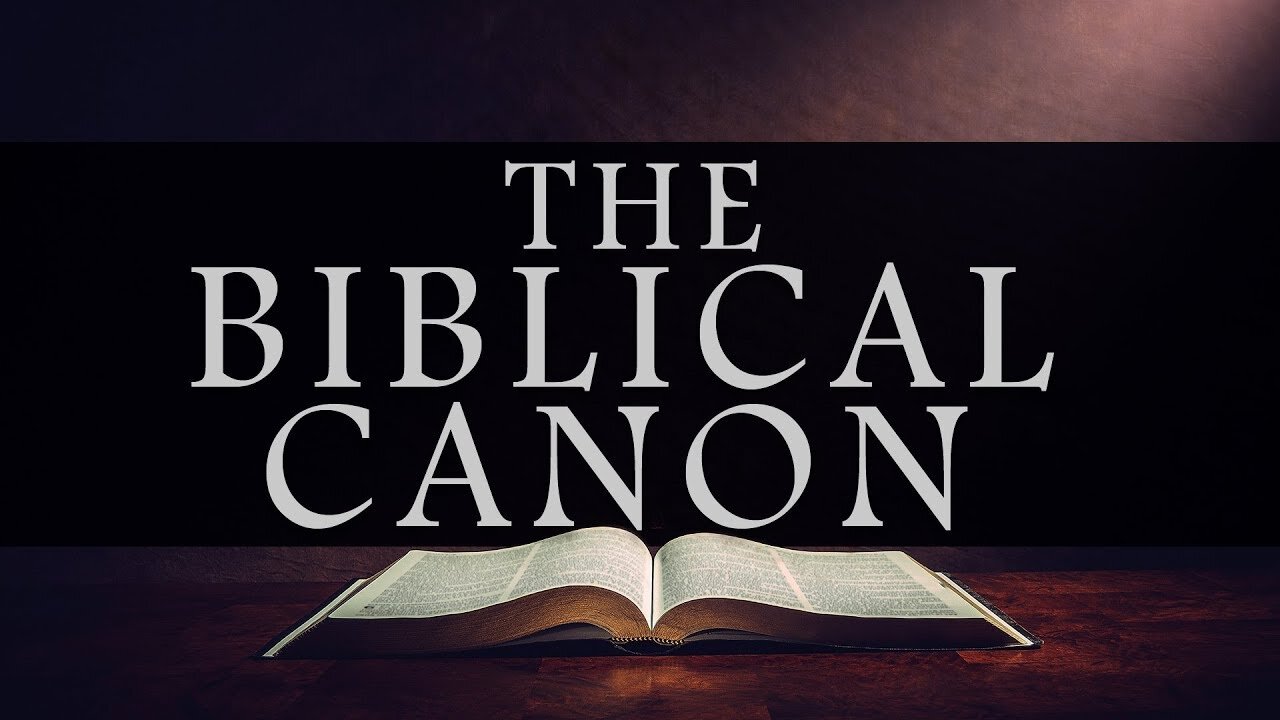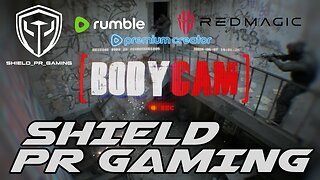Premium Only Content

Why The Book of Enoch Is Not in the Canon | James White
This is for a post detailing the reasons why Enoch was and is not included in the Holy Bible as an inspired book:
■ Should "The Book of Enoch" Be Considered Part of the Canon? (https://tinyurl.com/mtapdj7n)
》》The entire James White debate can be found here: "The Great Debate IX: Is The Apocrypha Scripture? (White vs Michuta)" - https://youtu.be/AAoNfH1rFtE 《《
𝐓𝐑𝐀𝐍𝐒𝐂𝐑𝐈𝐏𝐓 (𝒑𝒓𝒆𝒕𝒕𝒚 𝒄𝒍𝒐𝒔𝒆)
﹏﹏﹏﹏﹏﹏﹏﹏﹏﹏﹏﹏﹏﹏
And so, as we examined this issue this evening, my thesis will be very straightforward.
The Apocryphal books, including Tobit, Judith, the Maccabees, Sirach, along with the additions to the canonical books like Baruch, Bell and the Dragon and the Epistle to Jeremiah. Whatever it might be, they are not inspired scripture. These books were not accepted as Canonical scripture, by the Jews, to whom the oracles of God had been committed as the apostle Paul says in Romans chapter 3 verse.
𝑺𝑪𝑹𝑰𝑷𝑻𝑼𝑹𝑬 𝑷𝑨𝑼𝑺𝑬 𝘙𝘖𝘔𝘈𝘕𝘚 3:1-2
》》(NCV) So, do Jews have anything that other people do not have? [....] The most important thing is this: God trusted the Jews with his teachings.
》》(CSB) So what advantage does the Jew have? [....] First, they were entrusted with the very words of God.
》》(SDNT) What then is the advantage of the Jew? [....] First indeed, that they were entrusted with the oracles of God. (Samuel Davidson, The New Testament: Translated from the Critical Text of Von Tischendorf)
𝑼𝑵𝑩𝑹𝑬𝑨𝑲
Two, they were not a part of the books laid up in the temple and considered holy in Palestine or anywhere else for that matter.
The books themselves refute the claim of their own canonical standing, either by containing clear and irreconcilable contradictions and historical errors, or by themselves making reference to the already closed canon of the Old Testament.
Likewise, the Lord Jesus and the Apostles, though surely aware -- as we have seen -- of these books and their contents, never once cite them with the authoritative phrases:
➤ “It is written”
➤ “Thus saith the Lord”
All the typical phrases that are used to identify Scripture, which they do with the Old Testament books.
Nor do we find any evidence of disagreement on the extent of the cannon between the Lord and the Apostles and their Jewish opponents, for example, in the gospel narrative.
[𝐵𝑅𝐸𝐴𝐾]
We have what's called a BARAITA. A Baraita is an ancient tradition. Many of these traditions go well beyond the time of the New Testament, even into the Intertestamental period. It is these writings which shed so much light upon the customs of the Jews that we see in the Gospels.
And there you have a listing given to us [of]19 books in the Old Testament excluding the books of the law, which were of course five; 19 + 5 is 24 -- and we consistently find one of two numbers in Jewish sources: 22 or 24. And they're not actually two different numbers. It depends on whether you, for example, attach lamentations, Jeremiah, how you count the books in that way.
Both numbers represent the same Canon found in Protestant Bibles today and this is found in a Baraita, an ancient tradition going back even before the time the New Testament.
Josephus, an excellent resource, Josephus the historian, refers to the practice that they had where they would “lay up scrolls of the Scriptures in the Temple,” and he makes reference to this: for example, a number of places in Antiquities [Dr. White goes through the reference list too quick] that they would lay these Scriptures up in the temple. The Apocryphal books were never laid up in the temple.
Why would they be treated differently by the Jews themselves?
We also read, for example, if as the tannaitic literature maintains, not just the law and the prophets, but also the Hagiographa, that is, the writings belong to the temple collection, those kept within the temple and by the end of the temple period had belonged to it for such a long time that it was no longer permitted even to bring in fresh copies of the books, let alone copies of fresh books. How can this be reconciled with the current beliefs that the Hagiographa were not formally recognized as canonical until the Senate of Jamnia held after the temple had been destroyed.
Here, Roger Beckwith has fine work, The Old Testament Canon of the New Testament Church, demonstrates that the idea that the canon was still open and unknown at this time is simply against the factual evidence that we see in this particular situation.
Josephus again, in Against Apion 1:7, gives the number of books as 22. He specifically rejects those books written after Malachi. That is, the Apocryphal books. There is no reason to believe that Josephus's cannon is recent. That is, as most believe today, he is referring to a cannon that had been in place for 300 years.
[𝐵𝑅𝐸𝐴𝐾]
Now time precludes our investing much more time in another important area relevant to our subject, that being the fact that the Apocryphal books simply do not measure up as Scripture regarding their historical errors.
The Book of Judith, for example, is a mishmash of historical errors so obvious and so extreme that defenders of its canonicity have been forced to say it is actually an allegory, or something along those lines; but there's no evidence of this.
Likewise, you do not find Canonical Scripture asking the readers to forgive the book for its shortfalls as you do in Second Maccabees chapter 15.
But what about Jamnia?
What about this alleged closing of the Canon?
Well, actually, Jamnia was merely a Jewish college or academy founded by Rabbi Yohanan ben Zakkai. The date of the session may have been as early as AD 75 or as late as AD 117 as regards to the disputed books, the discussion was confined to the question of whether Ecclesiastes and the Song of Psalms, and possibly just Ecclesiastes alone, “made the hands unclean.”
When you would touch the scrolls of Scripture, it would make your hands unclean because they were Holy. That is, were they divinely inspired? That's all that was discussed there. There was no discussion about the Apocryphal books being canonical because the Jews had not ever viewed them in that way.
And what about Jesus and the apostles? Well, as Beckwith says, “the undeniable truth is that the New Testament, by contrast with the early fathers, and by contrast with its own practice in relation to the books of the Hebrew Bible, never actually quotes from or ascribes authority to - any of the Apocrypha.”
Did they know of those books?
Of course they knew of those books.
But remember, they knew of a lot of books. Paul quoted from Pagan philosophers. Jude quotes from the Pseudepigrapha. That doesn't mean they accepted those books as canonical, but they had read those books and were aware. Of their existence.
﹋﹋﹋﹋﹋﹋﹋﹋﹋﹋﹋﹋﹋﹋
𝐏𝐑𝐎𝐆𝐑𝐀𝐌𝐒 𝐈 𝐔𝐒𝐄 𝐎𝐅𝐓𝐄𝐍 𝐅𝐎𝐑 𝐌𝐀𝐊𝐈𝐍𝐆 𝐓𝐇𝐄𝐒𝐄 𝐕𝐈𝐃𝐄𝐎𝐒 (some more often than others):
𝑀𝑌 𝑂𝐿𝐷 𝑌𝑂𝑈𝑇𝑈𝐵𝐸: https://www.youtube.com/@PapaGiorgio200/videos
﹏﹏﹏﹏﹏﹏﹏﹏﹏﹏﹏﹏﹏﹏﹏﹏﹏﹏
𝐴𝑈𝐷𝐼𝑂: AVS Audio Editor | Natural Reader (A.I. voice) | Microsoft 365 (making transcripts from audio/video) | AI_LALAL (a program that separates background noise from voice audio - www.lalal.ai)
𝐺𝑅𝐴𝑃𝐻𝐼𝐶𝑆 (𝑝𝑖𝑐𝑡𝑢𝑟𝑒𝑠): ArcSoft Photo Studio (old but still good) | ACDSee Photo Studio | Pixlr E Photo Editor | Movavi Picverse
𝑉𝐼𝐷𝐸𝑂: VEGAS Pro (latest version) | CheckSub. (subtitles) | Movavi Video Editor | Doodly
A shout out to 𝐺𝐿𝑂𝐵𝐴𝐿 𝐾𝑅𝐸𝐴𝑇𝑂𝑅𝑆 excellent YouTube Channel | https://tinyurl.com/2vmyxubh (for when I want a "green screen TV") | Larry Dors, who pieces together the same line being said from different movies. Check out his YouTube Channel: https://www.youtube.com/@LarryDors
Consider donating to these two wonderful causes: 𝐏𝐑𝐀𝐆𝐄𝐑 𝐔𝐍𝐈𝐕𝐄𝐑𝐒𝐈𝐓𝐘: https://www.prageru.com/donate | and/or | 𝐀𝐋𝐋𝐈𝐀𝐍𝐂𝐄 𝐃𝐄𝐅𝐄𝐍𝐃𝐈𝐍𝐆 𝐅𝐑𝐄𝐄𝐃𝐎𝐌: https://adflegal.org/donate
》》Brought to you by 𝑹𝑬𝑳𝑰𝑮𝑰𝑶-𝑷𝑶𝑳𝑰𝑻𝑰𝑪𝑨𝑳 𝑻𝑨𝑳𝑲: religiopoliticaltalk.com
-
 2:14:09
2:14:09
LFA TV
1 day agoRUMBLE RUNDOWN WEEK 6 with JEREMY HERRELL AND SHAWN FARASH 11.15.25 9AM
178K13 -
 1:44:16
1:44:16
HotZone
8 hours ago $6.92 earnedLive: The Hidden Crisis in US Special Ops: What They’re Not Telling You About Women in Combat
27K22 -
 53:25
53:25
Athlete & Artist Show
22 hours ago $3.51 earnedBombastic Bets & Games w/ Team Canada Veteran!
24.3K1 -
 53:13
53:13
X22 Report
7 hours agoMr & Mrs X - It All Revolves Around Marxism, Think Political Correctness, Midterms Are Safe - EP 16
86.4K27 -
 44:27
44:27
I_Came_With_Fire_Podcast
13 hours agoThe Right's Drift into Neo-Marxism & America's Populist Crossroads
19.5K16 -
 LIVE
LIVE
Amarok_X
6 hours ago🟢LIVE 24 HR STREAM? | ARC RAIDERS TO START | OPERATION 100 FOLLOWERS | USAF VET
46 watching -
 3:53:58
3:53:58
Pepkilla
6 hours agoDay 2 of Camo Grinding Black Ops 7 ~ Until My Brain Rots
9.28K2 -
 27:34
27:34
marcushouse
8 hours ago $1.99 earnedWOW! I Was NOT Ready For This One… 🤯 | Starship & New Glenn Lead The Race!
6.97K2 -
 LIVE
LIVE
MrR4ger
8 hours agoD4RK and D4RKER TO START THEN ARC R4IDERS W/ TONYGAMING AND AKAGUMO
32 watching -
 4:21:39
4:21:39
Shield_PR_Gaming
6 hours ago11/15/25 Hittin some Bodycam a bit as well as other games!
2.8K1